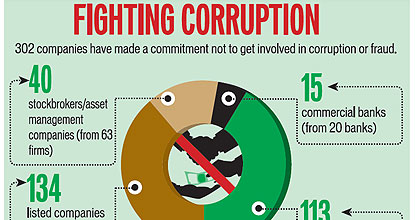
Many listed companies are not ready to stop paying "tea money" for fear of disrupting their working practices, which could lead to projects not finishing on time and losing their competitive edge, a senior Securities and Exchange Commission (SEC) official says.

The number of listed companies ready to commit to good corporate governance and to reject corruption has dropped as many are unwilling to stay away from bribery, said senior assistant secretary-general Chalee Chantanayingyong, referring to the securities watchdog's talks on the issue with listed companies.
As of Wednesday, 302 companies had declared their commitment to not get involved in corruption or fraud. However, only nine have been fully certified by the Collective Action Coalition Against Corruption, which is endorsed by the Thai Institute of Directors.
The nine companies are Somboon Advance Technology Plc (SAT), S&P Syndicate PLC (S&P), Siam Cement Plc (SCC), InTouch Plc (INTUCH), Bangchak Petroleum Plc (BCP), The Erawan Group Plc (ERW), Kasikornbank (KBANK), Tisco Financial Group Plc (TISCO) and Bank of Ayudhya (BAY).
Mr Chalee cited the World Bank's report on the Observance of Standards and Codes that inefficient law enforcement and corruption are weak areas of the Thai capital market and are big obstacles to market development, even though Thailand earned a high score for corporate governance.
Lenient law enforcement for stock investment is highlighted by the fact that a mere 7% of 382 investigated cases resulted in any punishment.
Under the time-consuming legal process, the SEC sends a legal complaint to the Department of Special Investigation before it is forwarded to the Attorney-General for consideration of whether the case should go to court or be dropped.
Following moves by the SEC and other stock market participants to push corporate governance over the past 10 years, the Thai stock market's CG Watch ranking vaulted into the top three in Asia in 2012 in the Asian Corporate Governance Association ratings. It was behind only Singapore and Hong Kong.
Also, the top 100 companies among Thai listed firms got the highest scores among Asean countries.
Regarding the World Bank's concerns about the Thai capital market’s weak points, the SEC and private firms are taking action through private-sponsored bodies such as the Anti-Corruption Organisation of Thailand (ACT).
Its members include the Board of Trade, Federation of Thai Industries, Thai Bankers’ Association, Thai Institute of Directors and Federation of Thai Capital Market Organisations consisting of the Thai Listed Companies Association and the Association of Thai Securities Companies.
"Corruption is the big problem in Thai society. The corporate governance of state officials is also lower than that of the private sector and it is a big obstacle for the country's development. We need help from all parties to improve it,” said Mr Chalee.
He said the SEC has tried to encourage and push corporate governance as key for sustainable development of listed firms because it is associated with the bottom lines of profit (economic governance), people (social) and the planet (environment). Thai companies are performing well only in profit-making but are failing in people and environmental issues.
The SEC now requires listed firms to disclose their corporate governance progress at least once a year. They should give information to annual shareholder meetings and they need to provide more corporate governance practices in following years. The SEC will use market enforcement or punishment if they still ignore developments on corporate governance and anti-corruption.
The SET also plans to set up an index to highlight companies with good corporate governance.
ACT chairman Pramon Sutivong said the number of companies joining the anti-corruption commitment will increase from 300 to up to 2,000 thanks to the global trend and market forces.